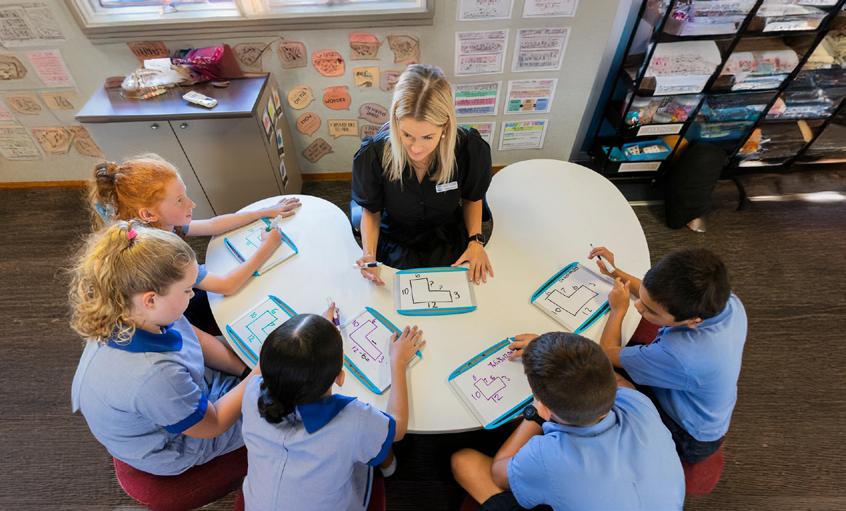
Fostering staff wellbeing and ensuring a balanced workload for all CSBB staff


Fostering staff wellbeing and ensuring a balanced workload for all CSBB staff
Our commitments for 2025
As we strive to uphold our Vision of authentic professional Catholic education, delivered with care and compassion, we recognise the integral role that all Catholic Schools Broken Bay (CSBB) staff play in achieving this mission. Our purpose, to inspire hearts and minds to know Christ, to love learning and to use their talents to be the best they can be, guides our every action.
In light of this we, as a system, aim to foster a culture where staff can thrive personally and professionally, thereby enhancing the quality of education provided to our students. To this end, and informed by the voice of our staff, we are committed to implementing a series of initiatives aimed at prioritising wellbeing and ensuring a balanced workload for all our staff. This document responds to two key themes highlighted by our staff through the Culture Survey (2024), the Communication and Engagement Sessions (2024) and the Teacher Workload Working Party (2023). These themes are fostering staff wellbeing and ensuring a balanced workload for all staff.
CSBB is committed to fostering the wellbeing of each of our staff members so that ‘they may have life, and have it to the full’ (John:10:10). The goal of our Wellbeing Strategy is not to simply ‘flourish’ all the time at work, but rather to be an informed and active participant in shaping our own wellbeing as we navigate the highs and lows of life.
We understand that when staff are physically, mentally, socially, emotionally and spiritually well, they exhibit higher levels of motivation, engagement, and resilience which positively influences their interactions with students and colleagues. Positive staff wellbeing directly impacts on individuals’ ability to perform effectively and sustainably.
In living our Values, we continue to prioritise staff wellbeing, recognising that it also enhances effectiveness, promotes retention and recruitment of talented individuals, and supports continuous professional growth. Ultimately, by fostering staff wellbeing, CSBB upholds our commitment to strengthening a community where faith is authentically lived and witnessed, enriching both educational outcomes and the overall mission of the Diocese.
The CSBB Capability Framework defines the behaviours, skills and knowledge our system and people need to succeed. Pillar 1 of the Framework is described as: HUMAN FLOURISHING: ‘Let your light shine before all’ (Matthew 5:16) and includes behaviours that support wellbeing, such as:
▶ Be Resilient and Courageous
▶ Live our Values with Integrity
▶ Be Self-Aware
▶ Commit to our Catholic Culture
We have adopted the PERMAH wellbeing framework developed by Professor Martin Seligman, one of the world’s leading researchers in positive psychology and human flourishing. Seligman’s framework is completely aligned with our Values and suggests that wellbeing is cultivated by the presence of positive emotion, engagement, relationships, meaning, accomplishment and health in our lives.
The CSBB Wellbeing Framework is a three-tiered multi-system of practices inclusive of Universal, Targeted and Intensive Wellbeing Supports. This Framework is designed to enhance the practice of wellbeing in the workplace, and beyond, from an intensive and targeted perspective to that of a preventative and proactive approach. More specifically, it is underpinned by our CSBB values of Faith, Joy, Witness, Compassion and Courage.
Aligning our Values to the wellbeing PERMAH pillars ensures that the wellness programs, positive psychology exercises, professional learning opportunities and spiritual formation programs are a natural extension of CSBB’s vision, identity and aspirations.
The following commitments have been identified as particular priorities for fostering the wellbeing of our staff.

Evidenced based practices, activities and strategies have been created and developed, as well as existing opportunities extended, to enable members of the CSBB community to thrive and flourish, including:
▶ providing further opportunities for staff to engage in prayer, reflection and meditation, fostering spiritual wellbeing and resilience
▶ incorporating moments of prayer or mindfulness into staff meetings or professional learning sessions to nurture a sense of unity and purpose
▶ continuing our partnership with Mindarma to provide ondemand access to a continuous learning platform inclusive of universal wellbeing supports
▶ developing and distributing a CSBB Staff Wellbeing Calendar each term aligned to PERMAH and our Values
▶ developing a CSBB Reward and Recognition Program

▶ providing professional learning in Mental Health First Aid
▶ promoting wellbeing initiatives such as R U OK? Day across CSBB
▶ exploring options to support staff access to affordable fitness facilities
Designed to enhance and build upon the opportunities, supports, and initiatives at the universal level. Interventions are targeted to the specific type of role within the organisation and specific to individual needs, including:
▶ embedding Continuous Improvement Conversations across CSBB, including a Wellbeing Goal for every staff member
▶ collaboratively developing Culture Survey Action Plans for each school and workstream to build a positive culture in every workplace
▶ continuing to support the Principal Coaching Program
Mental health and wellbeing supports in time of need. Evidenced based support and external partnerships are accessible and can be tailored to the specific needs of individual staff members, including:
▶ promoting the resources of AccessEAP counselling (1800 818 728) – including ‘Manager Support’ for Leaders
▶ introducing Mental Health First Aid Ambassadors within CCC and schools
▶ reviewing CSBB’s policies and procedures for Critical Incident Response
▶ providing individual staff wellbeing check-ins, as needed, with the Staff Wellbeing Partner
Please be assured of our strong commitment to Staff Wellbeing. Take the time to familiarise yourself with the variety of resources available on the Staff Wellbeing Tile on our intranet, Connect.

A balanced workload for all staff is important because it supports the overall wellbeing and effectiveness of individuals within CSBB. This balance not only contributes to better physical and mental health, but also enhances job satisfaction and motivation. It allows employees to maintain focus and productivity, leading to higher quality outcomes and achievement of our Towards 2025 Strategy. Additionally, a balanced workload promotes a positive work environment by fostering teamwork, collaboration and effective time management skills among staff members.
The following commitments have been identified as priorities for maintaining a balanced workload for all staff, including:
▶ using Continuous Improvement Conversations (CICs) to give feedback, promote role clarity, focus on key priorities, and build the capacity of staff
▶ providing regular training sessions to familiarise staff with technologies and tools that automate routine tasks and can simplify their work
▶ offering targeted professional learning opportunities tailored to specific roles and growth development to enhance skills and efficiency of all staff
Effective Communication Channels:
▶ embedding the CSBB Intranet, Connect, as a streamlined, ‘one-stop shop’ communication tool
▶ promoting Service CSBB to ensure enquiries and school support needs are attended to promptly
Flexible Work Practices:
▶ facilitating flexible work practices, such as working remotely or part-time, where appropriate to role

▶ encouraging collaboration and networking between different schools and workstreams to share resources, knowledge and best practice
▶ integrating the work of the School Marketing Officers (SMOs) and Parent Engagement Coordinators (PECs) with the work of the School Services Team to serve school communities more effectively
▶ using the School Services Role Clarity Tool to enable the School Services Team in each school to collaborate, support each other, prioritise work and work effectively
The following commitments have been identified to prioritise time to teach and to support the workload of Classroom Teachers, including: Supporting
▶ developing system-wide Behaviour Management procedures with clear expectations and consequences for student behaviour to be implemented at each school according to their own context
▶ increasing the number of Subject Matter Experts (SMEs) in the Student Achievement Workstream to support student behaviour
▶ providing professional learning on effective classroom management and behaviour support strategies
▶ developing and delivering guidelines and direction for the use of screeners and assessments in the Early Years which will identify and support student need as soon as possible
▶ ensuring that the integration of the Eileen O’Connor School, including support classes, addresses the needs of students with a disability and builds the capacity of our staff
▶ embedding the CSBB Pedagogical Framework to assist teachers in selecting the most appropriate teaching strategies for students
▶ implementing a new Needs-Based Resourcing Model across CSBB schools to support inclusive education
▶ designing and implementing a model of professional learning that supports teachers with differentiated instruction and resources to meet the needs of diverse learners
▶ reissuing and discussing the NCCD fact sheets with school leaders to ensure shared understanding and implementation of consistent expectations for NCCD processes
▶ reviewing opportunities for existing learner diversity roles in schools to embed a case management approach and enhance in-class support for students.
▶ providing curriculum resources and templates to assist teachers in planning units of work to strengthen consistency across schools and alignment with new curriculum
▶ reviewing the NESA requirements for programming with school leaders to ensure understanding and consistent implementation across schools to minimise any local additional requirements
▶ providing time through Collaborative Coaching (primary) and Collaborative Planning Time (secondary) to deepen teachers’ understanding and implementation of the new syllabuses
▶ utilising system-wide Staff Development Days to deepen teachers’ understanding of Curriculum Reform and development of consistent practice across schools
▶ measuring the impact of teaching and learning on student outcomes more effectively through an enhanced use of data
▶ developing and implementing universal K-6 reporting templates that reduce free-text narratives and ensure consistency of reporting across schools
▶ providing guidelines for reporting to assist teachers and parents to understand the new reporting templates
▶ exploring options with school leaders to dedicate staff meeting time to reporting during reporting periods
▶ supporting the work of Parent Engagement Coordinators (PECs) in engaging parents positively in the life of the school
▶ embedding the CSBB Parent Charter into system and school policies and procedures
▶ developing and implementing system-wide guidelines for parent engagement – including receiving and responding to emails outside of work hours
▶ sourcing appropriate professional learning for system leaders on managing complaints and legal issues in schools
▶ developing a professional learning module on engaging parents effectively
▶ implementing the Leadership Formation Program to build the capacity of current and aspiring leaders
▶ using Continuous Improvement Conversations (CICs) to identify professional learning opportunities that directly address areas of teacher need
▶ designing and implementing a cohesive Middle Leaders Program
▶ integrating professional learning into teachers’ daily work routines by incorporating it into collaborative coaching sessions, staff development days, staff meetings and professional learning networks
▶ utilising technology platforms and tools (such as LinkedIn Learning) for professional learning that offer personalised learning experiences, interactive resources, and opportunities for ongoing support and collaboration
▶ encouraging school leaders to review their annual plan for school events to take into account the possible impact on teacher workload
▶ providing a bank of online resources to support teachers in constructing risk assessments for common school activities and excursions
▶ using the School Services Role Clarity Tool to identify administrative tasks where the School Services Team can support the workload of teachers in activities that serve the whole school or grade
▶ reducing the compliance burden on schools by further streamlining and centralising compliance processes